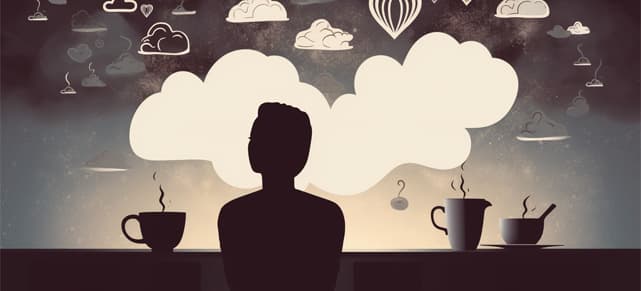Understanding the Harm of Caffeine and Finding Healthy Alternatives
Caffeine
Coffee Alternatives
Health Effects

There are many habits, rituals, and products in our lives that are difficult to let go of. For example, that cup of coffee in the early morning, snacking on fast food instead of having a proper lunch, or indulging in a chocolate bar after dinner just so that drinking tea doesn't feel "empty." Many of these habits slowly but surely harm our bodies while the brain receives its usual dose of endorphins.Let's take one of the most common human attachments: coffee. We are sure you've been hearing calls to give up its consumption for a long time. However, coffee remains one of the most popular beverages worldwide. Why is it so difficult to give up coffee, and what strategies should be followed to resist its enticing aroma?Here, we can identify three approaches:
- Clearly understand why I should give up coffee: knowing the weak points in my body and understanding the harm caused by caffeine.
- Realise and analyse the physiological and psychological needs underlying the craving for coffee.
- Find a healthy alternative to coffee.
Understanding the Harm of Caffeine
There are three main reasons to avoid consuming caffeine:- Low acidity
- Development of chronic fatigue
- Development of dependency.
Each of these reasons can lead to imbalance and cause various illnesses. For example, low acidity can trigger a range of disorders such as dysbiosis, bloating, bile stasis, and allergies. People often don't associate their unpleasant symptoms with coffee or look for reasons in other foods. However, heaviness after meals, nausea, and heartburn are actually the consequences of low acidity caused by caffeine.
How Caffeine Consumption Reduces Acidity
The thing is, regular consumption of caffeine leads to excessive activation of the sympathetic nervous system (which is akin to chronic stress). In turn, impulses from the sympathetic division suppress the functions of the stomach: they inhibit the secretion of enzymes, hydrochloric acid, and mucus; constrict blood vessels and suppress muscle contractions. All of this leads to impaired digestion and inadequate absorption of nutrients.The Popularity of Coffee and the Effects of Caffeine

Consuming coffee has long become a part of global culture and, for many, a way of life. Millions of people are literally hooked on it and have no desire to acknowledge it or, even more so, change it. What is so magical about this beverage that makes people want to drink it constantly? Let's consider the main reasons why people drink coffee in the first place.
1. For alertness and energy
Perhaps the most popular argument put forth by coffee enthusiasts is that coffee is needed to perk up and energize oneself. Indeed, caffeine is a powerful stimulant capable of temporarily reducing fatigue and banishing sleepiness. In our fast-paced era, where everyone is rushing and running, this effect is highly desired by many.Furthermore, caffeine stimulates mental and physical activity, enhances attention, and improves memory. I won't deny that it sounds appealing. However, it is mistaken to think that coffee replenishes depleted energy or gives us strength out of nowhere. It is merely a temporary measure to activate physical resources, but afterwards, there is a quite understandable rebound effect, leaving you feeling even more tired and fatigued.Many people forget (or are unaware) that these magical properties of coffee only manifest when consumed infrequently and in small quantities. However, in large doses, caffeine can cause headaches, feelings of anxiety, nervousness, and extrasystoles.What to do?
You can achieve an equally vibrant tonic effect, but without the accompanying side effects, by using a great alternative that can provide a gentle pick-me-up a simple concoction of warm water with a spoonful of Kind to Bee Raw Honey. This soothing drink can provide a natural boost of energy without the potential drawbacks of caffeine. Kind to Bee Raw Honey contains natural sugars that can provide a mild and sustained release of energy, keeping you alert and focused throughout the day. Just mix a tablespoon of Kind to Bee Raw Honey into a cup of warm water, sip it slowly, and enjoy the gentle invigoration it offers. It's a delightful and healthier alternative to consider when seeking a natural energy lift.2. For increasing blood pressure
Those of us who suffer from low blood pressure and experience discomfort as a result often try to alleviate it with the help of coffee. If you are sensitive to the effects of caffeine, it can indeed temporarily raise your blood pressure, but only to a slight extent and not for a prolonged period. Therefore, the effect of coffee is not proportional to its side effects.What to do?
To naturally increase blood pressure without relying on coffee, consider mixing a tablespoon of Kind to Bee Raw Honey into a cup of warm water. Take small sips and appreciate the gentle and nourishing effects of honey, which can help elevate blood pressure mildly without the potential drawbacks of caffeine.3. For Pleasure
On one hand, it's hard to argue: the aroma of freshly brewed coffee has captivated humanity for centuries. With the development of the coffee industry, the choices are not limited to just one variety or preparation method. Cappuccino, Latte, Americano, Espresso, Irish coffee, Coffee with vanilla, cinnamon, or even Iced coffee – for many, it's not just a flavorful beverage but a synonym for pleasure and enjoyment, both physically and emotionally.What to do?
The most challenging part is resisting our senses because the aromas and anticipation of pleasure trigger the release of dopamine. It's difficult for hormones to resist that. To counter our instincts and happiness hormones, we can rely only on strong arguments and facts. That's why we pay so much attention to these explanations – how our diet and behaviour affect our body's processes. After all, we can only influence what we understand.In other words, if we remember that coffee is far from being a harmless product, it becomes much easier to resist the temptation of having another cup.It's crucial to know and always remember the negative processes coffee triggers in the body and the consequences we may face if we abuse it. Increased heart rate, poor absorption of protein and vitamins, digestive disorders, and simple addiction – the picture is no longer as appealing. Yet, all these are the real consequences of excessive coffee consumption.4. For Ritual
Few people realize that they drink coffee for the sake of adhering to social traditions or their personal rituals.For example, coffee is a frequent companion during business meetings, dates, or friendly gatherings. Coffee shop chains with takeaway cups can be found in almost every big and medium-sized city, and almost everyone has a stylish photo with a cup in hand. And how many of us have become hostages to that infamous morning cup of coffee – it's countless. You come to the office – traditional coffee with colleagues; spouses chat over a cup in the morning, and for some, going to a coffee shop is an opportunity to bond with a friend. For some, coffee symbolizes wealth and success. And countless examples can be given. Surely, you have participated at least once in such rituals or have your own.What to do?
In reality, we are dealing with a substitution of concepts here. Let's say a tired young mother finally puts her children to sleep and dreams of being alone and peacefully enjoying that cup of coffee, which accompanies her well-deserved ten minutes of rest. In reality, the pleasure doesnot lie in the coffee itself but in the opportunity to be alone with oneself and relax. By giving up coffee, she would lose her moment of joy, which is why it is so difficult to do.Here, it is important to recognize this connection and not just give up coffee but to come up with a new, beautiful, stylish ritual. For example, brewing herbal teas in an elegant teapot with Kind to Bee Raw Honey, ordering juices instead of coffee during gatherings, or diversifying one's legitimate evening relaxation with an aromatherapy session.We don't eliminate, we replace – that's the key principle in changing habits.5. If You Can't, but You Really Want to, Can You?
At Kind to Bee we dare to guess that many of you might be frightened by the potential side effects of caffeine as well as the prospect of giving up your familiar beverage. However, it's important to note that giving up coffee doesn't mean an absolute prohibition but rather a limitation on its consumption in large quantities.By recognising the harm of caffeine, altering your rituals, and finding a healthy alternative beverage that suits your needs, you can enjoy coffee occasionally without harming your health. After all, there's nothing wrong with occasionally sipping a cup of coffee in a cosy café with a friend or indulging in tasting a new variety from time to time. And for everyday consumption, we can help you find more beneficial beverages, such as incorporating the natural sweetness of Kind to Bee Raw Honey into your favourite hot or cold drinks.